Japan-Korea Dialogue on the Rise of China, US-China Relations, and Security in East Asia
| Date: | November 8-9, 2013 |
|---|---|
| Venue: | Hotel Forest Hongo, Tokyo |
| Co-organized by: |
Security Studies Unit, Policy Alternative Research Institute University of Tokyo Program on US-China Relations Seoul National University |
Session 1: Japanese and Korean Views on U.S.-China Relations
| [Moderator] |
Keisuke Iida, University of Tokyo |
|---|---|
| [Presenter] |
Wooseon Choi, Korea National Diplomatic Academy Ryo Sahashi, Kanagawa University |
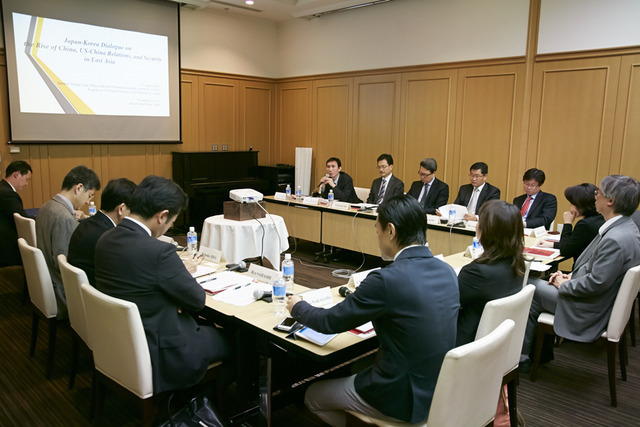
Photo: yamashita kayo
The first session of the Japan-Korea dialogue, chaired by Professor Keisuke Iida, has been held at the Forest Hongo Hotel on November 8th, 2013, and it developed as an exchange of views from the Japanese and Korean perspectives about Sino-American relations in the regional and global context.
Professor Akio Takahara has greeted the Korean delegation remembering how the first meeting of the Japan-Korea dialogue took place a decade ago, with the conversation continuing over the years. He invited the Korean delegation to address the Japanese counterpart frankly, as a frank dialogue can subsist whenever a sound and productive relationship has been established, as in the case between Japanese and Korean foreign policy experts.
The session has been structured around two major interventions, one from the Korean and the other from the Japanese side, and a successive debate.
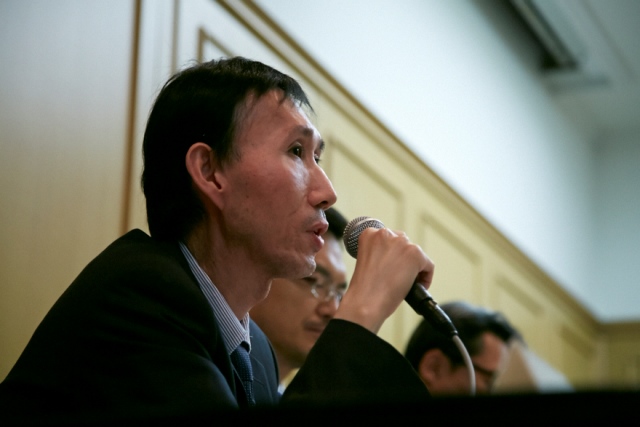
After all participants have introduced themselves, Professor Wooson Choi has articulated his view on the Korean perspective about the US-China relations, building on a largely realist analysis of the situation and prospected future developments. As for the present, Professor Choi stated that both great powers have an inherent interest in the maintenance of the current status quo in the East Asia region, which, despite the remarkable rise of China in the last decades, still sees the US as the hegemonic actor in terms of military capabilities and ultimate provider of security. On the other hand, today's China is not yet in a position of sufficient strength, particularly in military terms, to challenge the US position by means of a massive projection of forces outside its borders. The Chinese leadership appears to be aware of this, and it has been careful in avoiding open confrontation with the US. Clearly China has greatly benefited from the post-Cold War and American-lead world order, in which it has managed to become a major economic powerhouse. China has therefore no immediate interest in altering an international setting from which it has profited so much, and it cannot be consequently regarded as a revisionist state.
The US strategy in relation to China and its growth has been traditionally based on two pillars, namely that of integrating China within the international system, also with the view of stabilising the system itself, and that of refraining from overt provocations, while at the same time adopting a policy of both balancing and engagement.
However, the situation has underwent some change after 2009, when the growth of China, together with the modernisation and expansion of its armed forces, has meant that China has developed military capabilities able to potentially threaten US operations in Western Pacific. Against the background of a significantly more assertive Chinese foreign policy, the Americans have answered with a countering strategy. Finally, China appears today to be aware that it has been excessively assertive in the recent past and has launched a “rebalancing” initiative to improve its relation with the US.
According to Professor Choi, the sort of collaborative relation that has been witnessed between the US and China will continue from both sides in the foreseeable future, most probably for the next decade or so. However, for the long run, Professor Choi has articulated the view that a collision of security interests between the two powers has to be considered as a highly probable scenario. China will continue with the current double strategy of cooperation and self-strengthening, and will eventually try to break the encirclement of US bases in the region, in a bid to establish a regional hegemony in East Asia. The US will probably try to resist this move. The probability of a condominium being established between the two powers appears rather narrow, as by accepting it the US would jeopardise the system of alliance with the other East Asian nations.
Professor Choi sees the Republic of Korea's situation as somehow precarious. There are of course profound economic interests in the interaction between the PRC and Korea. Korean strategic preoccupations remain primarily focused on the threat of a conflict with North Korea, and this will probably continue in the foreseeable future. In this respect, the alliance with the US constitutes the greatest deterrent against the possibility of war against the Northern neighbour. Professor Choi has not excluded that Korea may be involved in an open confrontation with China, if the latter engaged in overt aggression; however, if one day China may no longer be countered by the US in the East Asian region, Korea could well bandwagon with China.
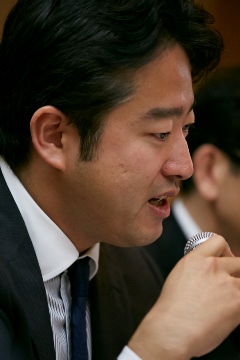
Professor Ryo Sahashi has articulated the analysis of the Sino-American relations from a Japanese perspective. He opened his statement by greeting his Korean counterparts, with whom he agreed on numerous points. Professor Sahashi initially formulated the idea of a bottom line in the Japanese stance about security in East Asia, by stating that, as long as the alliance between Japan and the US develops successfully, there is no reason for Japan to be excessively worried about a rising China. However, precisely on this point and more broadly about the US commitment in the East Asian region, there are several issues which may lead to concerns for Japan's security and overall geostrategic situation. Professor Sahashi's analysis concentrated on the way in which the US has envisaged its China policy in recent years, highlighting how particularly with the Obama administration the traditional mix of military and diplomatic approaches has been shifting more towards the diplomatic side, leaving doubts about the sustainability of the “rebalancing” against China.
While it is expected that the US and China will continue with their mutual engagement, in the long run this tendency may change also because of possible shifts within US foreign policy doctrine. An important factor to be closely monitored appears to be therefore the presence of an explicit commitment to global affairs from the US (the American “internationalism”), against the possibility of a renewed isolationism, which seems to be the preferential approach of some, however still marginal but not wholly uninfluential, domestic political movements. The eventual return to isolationist policies in the US would certainly have a great impact on the East Asian strategic situation, and this would mean for Japan the exclusive reliance on its own resources to ensure security.
More in general, the position of Japan is determined by its overall attitude towards foreign (and military) policy thinking. While the US has order-centric preoccupations, Japan has a threat-centric engagement with international politics, as it reacts to perceptions of threats against its interests. There are however elements of order-related preoccupations in the design of Japanese foreign policy, which are mostly tied to the commitment to an American-lead global and regional arrangement, mostly visible in the idea of “burden-sharing” in the context of regional security, in balancing against China, and in the engagement with South East Asia. Particularly concerning this region, Professor Sahashi has recalled the Japanese role (often in cooperation with Australia) to strengthen the coastguard capabilities of nations with borders on the South China Sea, and the effort to promote the unity of ASEAN.
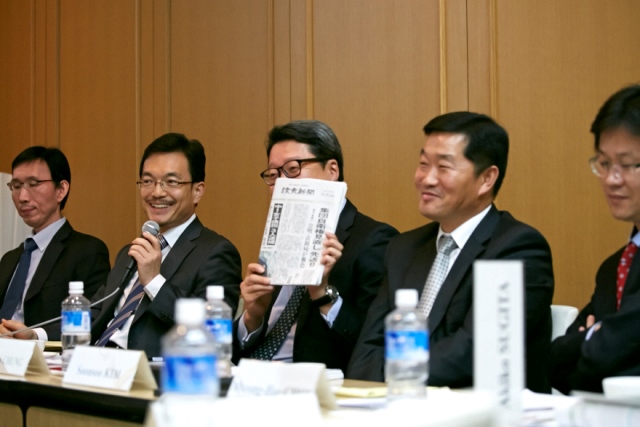
During the successive Q&A session, Korean and Japanese participants have further occasions to expose and clarify their views. Asked whether he saw a potential isolationist drive rising within US foreign policy circles, Professor Choi has replied that an isolationist US is considered as highly unlikely in Korea, a point successively stressed by professor Cho as well. Indeed, the key issue for Korea in its current geostrategic posture appears to be the security of its access to the US, which currently are not in immediate peril. However, professor Choi has remarked, if China will continue to rise, it is not unlikely to imagine that Korea will have to change its geostrategic orientation, bandwagoning with a hegemonic China. He also articulated the view that, in such a scenario, it is conceivable that Japan will be able to resist China's hegemony for a longer period.

Professor Jae-Ho Chung has explained how, in his view, the situation in East Asia is determined by four factors, namely the distribution of power among the various actors, the image or reciprocal perception of power, the Chinese policy towards the US and the US policy towards China. Within this horizon, Professor Chung thinks that the status quo in East Asia, if not already broken, appears however on the verge of being lost, essentially because of the rapid rise of China both as economic and as a military power. He has also recalled how technological change may sometimes induce non-linear transformation in the distribution of military capabilities, and that the projections for China to overtake the US as the largest economy in the world have seen their temporal horizon becoming closer and closer to the present, with the surpass being forecasted within the next fifteen years or even less. According to his view, there is little doubt that in this context the US-Japan alliance will also have to change. Professor Chung also added that there is uncertainty surrounding the real long term goals of China's foreign policy, apart from the obvious aggrandisement of its own power. However, considering that China has possibly been one of the countries which has benefited most from the post-Cold War globalised economic and political environment, they should have no inherent interest to alter this state of affairs, and therefore China may not be deemed a “revisionist state” in the current world order. In the face of a rising China however, Professor Chung has highlighted how the Korean foreign policy line is essentially underpinned by pragmatic considerations, as Korea is already nowadays “bandwagoning with the US for security, and with China for profit”.
Discussing the possibility of more radical changes in the security architecture of East Asia, several participants have highlighted numerous points with regard to possible future perspectives, challenges and limits. Professor Sahashi remarked that from a theoretical viewpoint the radicalisation of security issues for the Japanese state may lead to its abandonment of the NPT and to the acquisition of a nuclear deterrent. Apart from this extrema ratio case, his view is that Japan will have to rely increasingly on its own capabilities of self-defence. Of course, the problem is, as also agreed by Professor Chung, that the strengthening of Japan's self-defence capabilities should happen without being perceived as a provocation from the Chinese, albeit it is extremely difficult to determine what China will perceive as a provocation or threat, and what not.
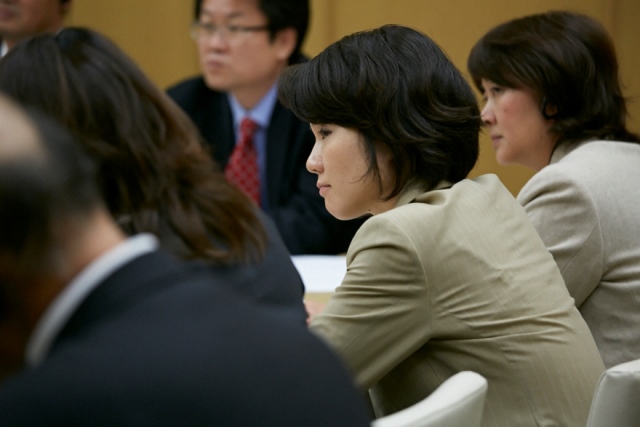
Professor Eto, commenting on the possibility of accepting some sort of Chinese hegemony in the region, has pointed out how the issue of liberal values constitutes a difficult hurdle to overcome, as the Chinese leadership does not appear to be committed to a liberal-democratic transformation of its domestic system, even in the foreseeable future. This should exclude the possibility of bandwagoning with China as long as the current difference in values remain in place.
Professor Takahara has intervened remarking how the Chinese leadership is sometimes regarded as monolithic, but in reality China's domestic situation is quite complex and the its evolution will be crucial for the determination of future priorities in the political and economic course of the country.
Symmetrically Professor Nakayama has stressed the importance of monitoring US domestic political evolution, stressing how events such as the so called “sequester” and the recent US government shutdown may be signs of a growing dysfunctionality which should be a matter of concern for US allies. The point of a visible US decline has also been made by professor Ueki.
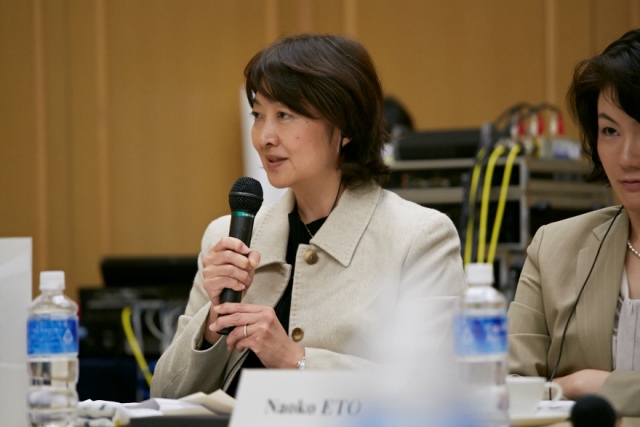
Finally Ms. Sugita, from the Japanese Ministry of Foreign Affairs has also expressed her appreciation for the Japan-Korea dialogue, an event intended to explore the ways in which peace and stability can be ensured to the East Asia region, and consequently to the world. She has suggested that multilateralism, so far little discussed in the session, may represent a valid alternative to exclusive bilateral negotiation strategies.
Session 2: Korea-China Relations and Japan-China Relations: Response Modes to China's Rise
| [Moderator] |
Jae-Ho Chung, Seoul National University |
|---|---|
| [Presenter] |
Jae-Ho Chung, Seoul National University Yasuhiro Matsuda, University of Tokyo |
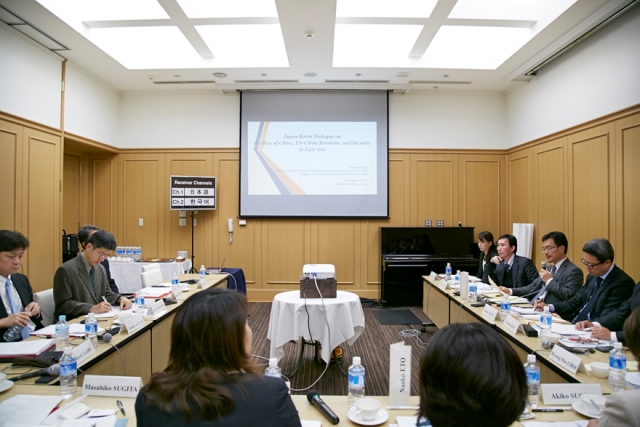
The second session of the Japan-Korea Dialogue, moderated by Professor Chung Jae-Ho, and after the presentation of both Japanese and Korean participants, developed as a discussion and exchange of views concerning the relations of Japan and Korea towards China, whose economic and military presence is steadily increasing, concentrating on possible ways to respond to it. The session also addressed issues of Japan-China and Korea-China relations. Session 2 and session 3 were conducted in Japanese and Korean languages with simultaneous translation.
Professor Chung Jae-Ho's Presentation: “China as Seen from Korea”
Professor Jae-Ho delivered a presentation on the current Korea-China relations while assessing their reciprocal interactions since 1992. He estimates that the 21 years of their relation can be graded high for its growing speed, range, and durability. There is a gap, however, between official declarations made at five-year interval and the actual situation. The Koreans evaluate bilateral economic ties as “hot”, diplomatic ties as “warm”, and security ties as “cold”. China, on the other hand, evaluates the relation as generally good, but unstable. At this juncture, the two countries finds themselves in a strategic crossroads. Some argue that Korea is friendly to the U.S. but not quite enough to China.
Indeed China-Korea relations rapidly worsened in 2010 when Beijing supported North Korea in the incidents of ROKS Cheonan sinking and the shelling of Yeonpyeong island. The atmosphere changed again in 2012, which marked the 20th anniversary of Korea-China diplomatic normalization. The Chinese regarded such anniversary as important. Xi Jinping himself, then Vice President, attended the ceremony. China paid great attention to Park Geun-hye even when she was a candidate for the President of Korean. A meeting has been held between the two leaders this year, and the outcome was very successful. In this talk, the importance of bilateral relations of Korean and China clearly emerged and was confirmed, regardless of third parties and their positions. The words describing the state of bilateral relations did not change, albeit terms such as “deepening” or “substantiating” were used, stressing how close relations are becoming. One of the outstanding outcomes of this talk has been that several mechanisms of communication, between the President of Korea of Korea's and the State Council of China were finally put in place. Talks on military cooperation had already been started. Positive signals for an FTA between Korea and China were presented. The parties agreed that further interaction at national level was necessary in order to ameliorate mutual negative perceptions, as China has recently emphasized the importance of cultural exchange.
Despite such a positive mood in bilateral relations, Professor Jae-Ho has pointed out eight issues confronting Korea-China relations. The first issue is a historical problem, namely the dispute on whether Koguryo was historically part of Korea or of China. Secondly, the issue about collision of norms, values and rules, extending to the difference in political systems. Thirdly, changes in the Korean trade surplus with China might worsen Korea's perception and policies towards China, which will lead to confrontation. Forth, as public opinions' mutual perceptions are already worsening, getting rid of this vicious cycle represents an important challenge. Fifth, the dilemma of cooperation between Korea and China on the North Korean nuclear question. Sixth, negotiations with China on the definition of the reciprocal EEZs. Seventh, the Korea-U.S. security treaty, with China pressuring its neighbor. Finally, while China only supports unification of the Korean peninsula by means of an agreement between North and South Korea, Korea wants unification regardless of the way it will occur. Korea regards keeping communication with China as a strategic element, so that support from Beijing may be obtained in some occasions, or at least in order to avoid clear opposition from China. At the same time, Korea thinks it is necessary to keep the alliance with the US in order to cope with China's uncertain intentions.
Professor Matsuda Yasuhiro's Presentation: “Japanese Strategy towards China: Engagement and Hedge”
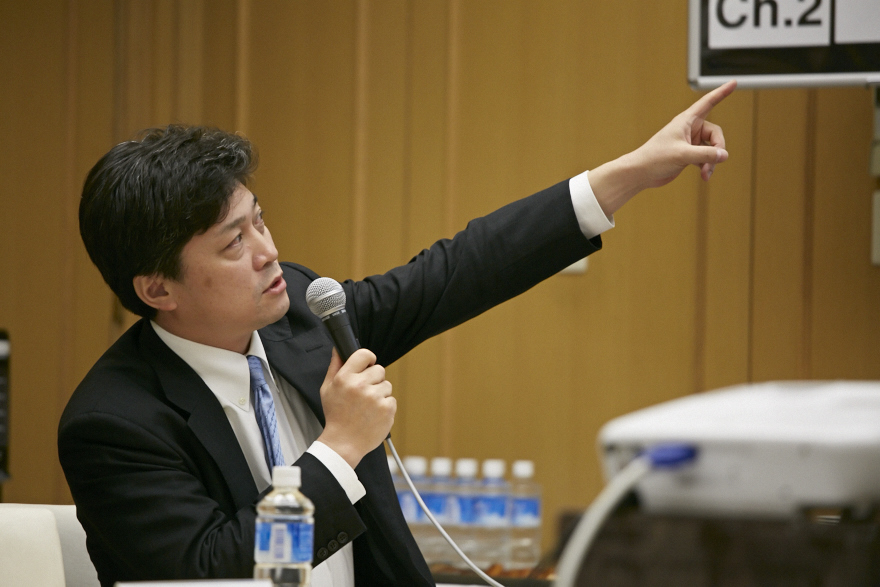
Professor Matsuda explained Japan's strategy towards China since the 1980s by assuming Japan's four images of China. For Japan, China has been a huge neighbor who has managed to go through tremendous changes in the last century, but there is uncertainty regarding what will happen in the years to come. Professor Matsuda assumes four images of China, which he categorizes by its economic and military development, and its aggressiveness towards other states. He defines an image of China which is developing and harmonizing with other states as “Great Cooperative State”, a developed but aggressive China as “Hegemonic State,” a stagnating but harmonizing China as the “Failed State,” and a stagnating and aggressive one as the “Rogue State”. In 1950s and 1960s, China had frictions with its neighbors and did not refrain from the use of force. Domestically, China experienced the “Great Leap Forward” and Cultural Revolution, then the Tiananmen Square Incident in 1989. In those days, Japan feared that China would became a “Failed State” or a “Rogue State,” since China did not have a strong economy, nor a strong military. In order to prevent China from slipping into one of those conditions, Japan supported China to join the international society by stopping economic sanctions against it, a move embodied by the Emperor's visit to Beijing in 1992. After that period, China has progressed through modernization while occasionally posing threats to neighboring countries, as during the missile crisis with Taiwan, and by making large scale military exercises in 1996. Facing such an aggressive Chinese state, Japan has realized the importance of creating some sort of hedge against China. In that period, Japan has been concerned more about China becoming a “Rogue State” than fearing its collapse. Therefore, Tokyo started to redefine and strengthen the alliance with the US. In response, China has begun a firmer attitude towards Japan, with Chinese politicians making improper public speeches about historically controversial matters. Especially Jiang Zemin's speech criticizing Japanese militarism during his visit to Tokyo in 1998 significantly affected the Japanese elite's view on China in a negative fashion.
The share of Japanese people expressing a positive feeling towards China was relatively high in 1979 (80%), and in 1984 (70%), but it rapidly dwindled in 1989 after the incident of Tiananmen, and worsened in the 2005, 2010, and 2012 surveys. It appears therefore that there may be a correlation between China's image in Japan and the use of violence by Chinese authorities. The share of Japanese people with positive feelings towards China stands now at less than 20%.
After the start of 21 century, Japan could no longer simply rely on a strategy of hedging, as the power of China had become very large. Being certain that China will become an economically and militarily strong country, Japan has to engage China in order to prevent it from becoming a “Hegemonic State”, while at the same time balancing against it.
Prime Minister Abe Shinzo has strengthened relations with China by promoting the idea of a “Mutually Beneficial Relationship Based on Common Strategic Interests.” This idea aims to prevent that a single issue like the Yasukuni shrine question may disrupt all bilateral relations, but it must be possible to contain it. It is also revealing how Japan-China relations can be hurt by a single and short term issue.
Finally, Professor Matsuda discussed the way in which Japan needs to mix engagement and hedge in its China strategy, especially considering the uncertain future of the big neighbor. The Japan-US security treaty is an important asset for the strengthening of Japan's hedge. Also, Tokyo needs to continue its engagement policy by using multilateral frameworks to make sure that China follows international rules. Korea is one of the most important partners in all this. Japan should be careful not to steer further misunderstandings regarding history in order to promote cooperation. Professor Matsuda concluded his talk by stating that Japan should become a state with power and attraction so that numerous other countries will be willing to keep good relations with it.
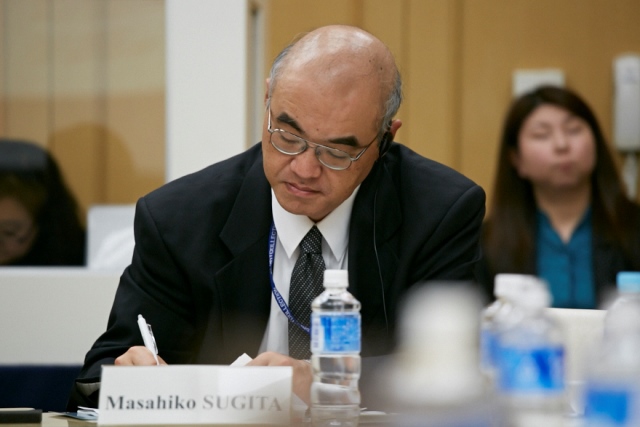
In the following Q&A session, Professor Matsuda, answering a question about evaluating Japan's engagement strategy towards China by Professor Takahara, said that it was “half success and half fail”. The strategy was a success from the viewpoint that China did not become a “Failed State” or “Rogue State”, also thank to support from Japan like in the case of ODA, but it failed in inducing China to become a “Cooperative State.” Answering a question on the possibility of alienating China from its neighbors, he replied that it is impossible to alienate Russia or India from China, because Russia still has a degree of control over China's military capabilities, and although it is true that India has concerns about China, this is still not enough to prompt a rivalry.
Asked by Associate Professor Kamo Tomoki about the possibility of cooperation between Japan and Korea, Professor Matsuda stressed the importance of cooperation proceeding even if there may be some quarreling, and pointed out that both countries have common strategic interests, and that their confrontation is largely emotional. He also pointed out the importance of expanding contacts between people, by giving examples of the Chinese or Koreans who has changed their images of Japan after visiting the country.
Mentioning an estimate of economic power in 2030, when the gap between Japan and China is expected to be significantly large, Professor Choi Wooseon asked about the possibility of Japan increasing its military expenditure. In response, Professor Matsuda said that considering Japan's increasing demand for social security, it will be difficult to increase spending for defense. He explained that Japan needs to expand the effectiveness of defense by utilizing methods such as loosening the prohibition of arms exportation. He also stated that current discussions in Japan on the right of collective defense are not intended for the expansion of this right beyond what is already accepted in international law.
Taking into account that Korea has economic ties with China and security ties with the US at the same time, Professor Jae-Ho argued that Korea is no longer in a situation where it can cope with a severe worsening of the China-US relations. Asked by Professor Takahara about his take on Chinese stability, he replied that China's instability has been overstated He explained that the Chinese government historically collapses in the presence of foreign threats, emergence of a military clique, and riots occurring simultaneously, while today is the most peaceful period in Chinese history. Current demonstrations in China are mostly aimed at corrupted local governments, rather than to the central government, and most of those demonstrations are little organized groups gathering no more than a few dozens of people.
Replying to Professor Wooseon's question about Japan's attitude towards the Senkaku issue with respect to the influence of aggressive factions in China, Professor Matsuda indicated that China's strong attitude towards Japan makes diplomacy more difficult with other countries as well. Asked whether “active peace” discussion in Japan is a clue of Japan “leaning to the right,” he argued that wordings such as “leaning to the right” have a different meaning when used in domestic context than in international context. Considering what the LDP stated when it was in the opposition and during the electoral campaign, the linkage with the pacifist New Koumeitou, and the difficulty in amending the constitution, Japan will not “learn toward the right” as foreign countries appear to be concerned.
Professor Shunji Hiraiwa asked about the influence of Korea-China relations vis-à-vis Japan. He responded that a too positive and cooperative relation can put pressure on Japan, because the importance of Japan for China would be diminished.
Professor Cho Sei Young made the argument that, although it might be theoretically preferable for Korea to settle the EEZ dispute as fast as possible, it is difficult to reach an early resolution in a situation about which both experts and public opinion have strong feelings. Professor Jae-Ho pointed out that after a future democratization of China it may be more difficult to expect Chinese concessions, because such disputes have a profound symbolic importance for the Chinese public.
Session 3: China-North Korea Relations
| [Moderator] |
Akio Takahara, University of Tokyo |
|---|---|
| [Presenter] |
Myeong-Hae Choi, Samsung Economic Research Institute Shunji Hiraiwa, Kwansei Gakuin University |
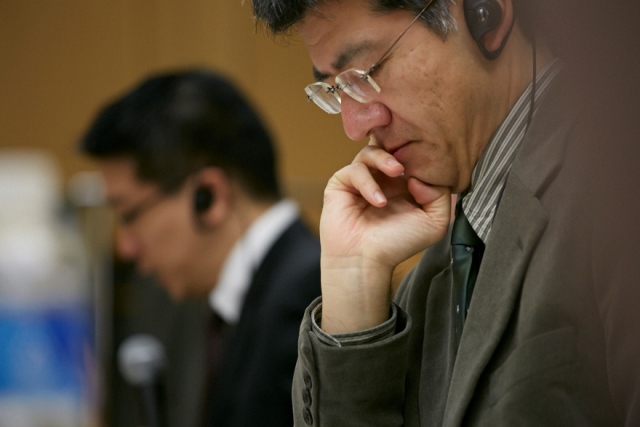
Session 3 was chaired by Professor Takahara, and conducted in Japanese and Korean languages with a simultaneous translation. A presentation was made by both Japanese and Korean participants, followed by a discussion about the transition in China-Korea relations, the change of China's position towards North Korea (and the ways to observe it), issues revolving around North Korea's nuclear weapons, and the role of the Six Party Talks.
Mr. Choi Myeong-Hae's Presentation: “Korea's View of China-North Korea Relations”
Mr. Choi Myeong-Hae explained the changes in China's policy towards North Korea by dividing it into three periods. In the 1990s under the presidency of Hu Jintao, China was a “bystander” only focused on the stability of the region, and at that time the relation with North Korea was poor; there was no margin to play an influential role in diplomacy. After the second nuclear crisis in 2002, China began to act as a “stakeholder” by using the nuclear issue as a means to improve the relation with the US. After the nuclear test of 2006, China started to claim for itself the role of the “balancer”, as a consequence of growing anxiety that Beijing may had lost its influence on North Korea, as the US-North Korea bilateral negotiations were proceeding. In the current age of Xi Jinping, some Chinese have argued that their country should become a “constructive manager,” which holds the lead and does not get affected by the inflammatory moves of North Korea. Mr. Myeong-Hae, however, opposed to this claim by stating that China's position is not going to change. He has argued that Beijing's policy towards Pyongyang can be studied and judged by China's own measures to North Korea, such as limiting the export of strategic materials like oil or food, closing of the border, or shutting down political funds (for instance). What China is doing right now is not a “surgical sanction” which pushes the North Koreans to consider a change in their policy, but Beijing is using the North Korean issue as a diplomatic bargain chip with others while maintaining strategic control over the situation.
Public opinion polls in China showed widespread negative feelings about North Korea at the beginning of this year, although the situation has improved recently, with 46.4% of people arguing that China should strengthen its interaction with North Korea more than South Korea, as opposed to 16% of people who argued the opposite. The Chinese government emphasizes the importance of Six Party Talks while having started several new channels to talk with North Korea. China keeps on emphasizing the early reopening of Six Party Talks as a means to denuclearization, as China wants to prevent Japan or the US from using the North Korean issue as an excuse to build up their armed forces.
Professor Shunji Hiraiwa's Presentation: “China-North Korea Relations”
Professor Shunji Hiraiwa started his talk by presenting his sympathy towards the views previously articulated by Mr. Myeong-Hae. He evaluated that no fundamental change has occurred in China's North Korea policy since 2002, except some minor variations. First of all, he explained that North Korea has two meanings for China. One is that of an adjacent country in geopolitical terms, and the other one is linked to North Korea's influence on the relations with big players, such as the US, Russia, Japan, or South Korea. North Korea, on the other hand, regards China as a constant threat as well as a supporter. The relation became more complicated especially since 1992, the year of diplomatic normalization between China and South Korea. Seoul saw the move as a statement of preference from China over the Northern neighbor, although it was quickly disappointed by realizing that this was not the case. North Korea, at the same time, perceived that they were going to be betrayed by China and started to question China's loyalty. Although the China-North Korea relation is sometimes represented as a “lips and teeth” relation, the reality is more complicated.
The largest variable in China-North Korea relation is the US, as the relation between the US and China directly affects the China-North Korea relation. The meaning of China for North Korea changes especially when China has good relationship with the US. In all this, South Korea became a larger variable after the transition to President Park Geun-hye. Beijing regards now the role of South Korea as more important than before. Seoul will become an important variable if the China-South Korea relations continue to improve.
China's position towards North Korea is aimed at controlling North Korea in the context of NPT and the Six Party Talks. China, Japan, the US, and South Korea share the same goal of denuclearizing the Korean peninsula, but they cannot agree on the process needed to reach such goal. While North Korean is now understood as seceding from the NPT, China has stressed that North Korea should be controlled within the NPT regime by returning to the abidance of the NPT rules. Japan and the US claim instead that North Korea should be charged with a penalty when rejoining NPT. Regarding the Six Party Talks, while China argues for reopening them without any condition, Japan and the US demand for conditions to be attached. Their opinion is that the Six Party Talks would constitute just a safe haven for the North Koreans, if the parties agree to spend so much time just to pursue interlocutory diplomatic exchanges. Japan, the US, and South Korean need to cooperate to push China to use the leverage they possess towards North Korea. China has constantly been expressing messages both of warning to North Korea and to the international community not to provoke North Korea. Professor Hiraiwa assesses that, although China has started to make more use of its leverage, a fact reflected in some banks (including four major commercial banks in China) having stopped some operation with Pyongyang, that is not enough to change North Korea. Finally Professor Hiraiwa said that, while evaluating China's changing position, not only government declarations should be considered, but also changes of the Chinese specific attitudes towards North Korea have to be monitored. He finished his presentation by stating that scholars from Japan and Korea should draft some criteria for such evaluations and share them in a spirit of cooperation.
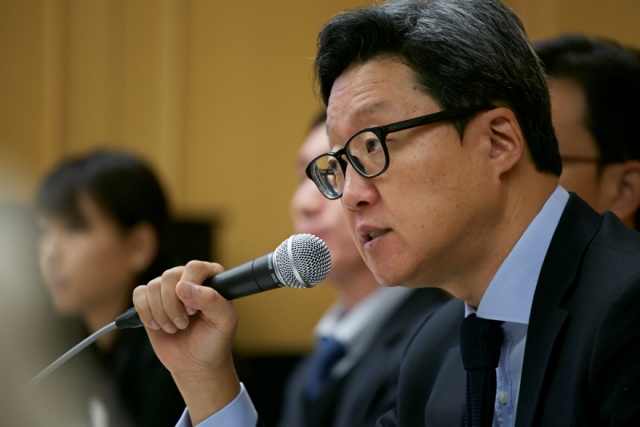
In the following Q&A session, presenters were given the opportunity to describe their ideas more deeply by answering questions from participants.
Professor Chung Jae-Ho first asked a question about evaluating North Korean's current nuclear capability, and the meaning of the stop to Pyongyang's nuclear development. Professor Hiraiwa responded by saying that, considering three successful nuclear tests, North Korea can be deduced to possess the capability of producing a small-sized nuclear arsenal. He also mentioned the importance of developing missiles as delivery systems. Considering that North Korea is continuing the development of missiles with the potential to reach the continental US, he concluded that North Korea does not have a complete nuclear capability against the US, but it is underway to acquiring it. In addition, he stressed the necessity for the Japanese to take in consideration the threat posed by the Nodong missiles, whose range covers most of the Japanese territory. The ultimate, long term goal of North Korea's nuclear issue is to achieve the abandonment of nuclear weapon development by North Korea, but a goal in a short term is the prevention of further nuclear proliferation. The Six Party Talks would be an effective framework, because all the countries involved in the process of the dismantling of Cold War military structures are included, as well as Japan.
Professor Choi Wooseon expressed the opinion that while China wants to keep North Korea as a buffer against the US, China's strategic position has not shifted, but Beijing has adopted a new tactic towards the US and South Korea by means of cooperative gestures. He analyzed how China appreciated cooperation with the above mentioned powers in correspondence to China's interests, for instance in the denuclearization of the Korean peninsula, while at the same time maintaining a certain level of control over North Korea, and keeping Six Party Talks as a place for negotiation. Professor Hiraiwa agreed on the idea of the Korean Peninsula as a structural buffer for China. Meanwhile, he stated that the most important relation for North Korea is with the US, that North Korea regards China as a card to be played against the US, and that North Korea keeps a margin of distrust towards Beijing.
Mr. Myeong-Hae explained, on a question about China's attitude to North Korea, that the changes of China's attitude are animated by the hope for stabilization of North Korea, softening of its stance, and improvement of reciprocal relations. In short, China thinks that they have to reconstruct the relation with North Korea to make it beneficial for Chinese interests. North Korea is showing that they are willing to change in the direction indicated by Beijing to win its favour, but, due to the unpredictability of North Korean regime, China is trying to change North Korea slowly.
Mr. Myeong-Hae, asked by Associate Professor Kamo about the stability of the regime of North Korea, mentioned a survey which demanded the opinion about the stability of North Korea to experts in the four neighboring countries. The result was that interviewees evaluated Pyongyang's stability as relatively high, with a score of 70 points out of 100. Professor Hiraiwa also argued that North Korea is not in a situation where major structural changes can occur, but small changes will happen within the country, and large change may materialise if China leads the way.
Professor Hiraiwa thinks there is a need to push China to act more strongly against North Korea to promote change, and that this kind of relation will make the North Korean problem a wholly Chinese problem.
In the closure of this session and the conference, Professor Takahara expressed his gratitude towards the participants from Korea. Professor Chung Jae-Ho replied by expressing his joy about having a frank and meaningful exchange of ideas, and wishing for a next round of talks in a future conference to be organized soon in Korea.
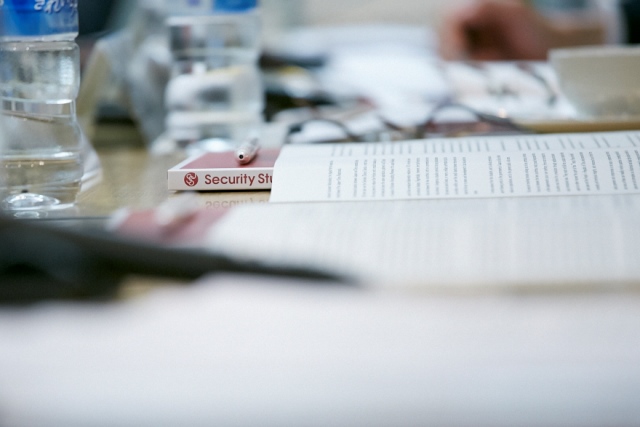
-
PDF: 11.1KB
-
PDF: 18.3KB
